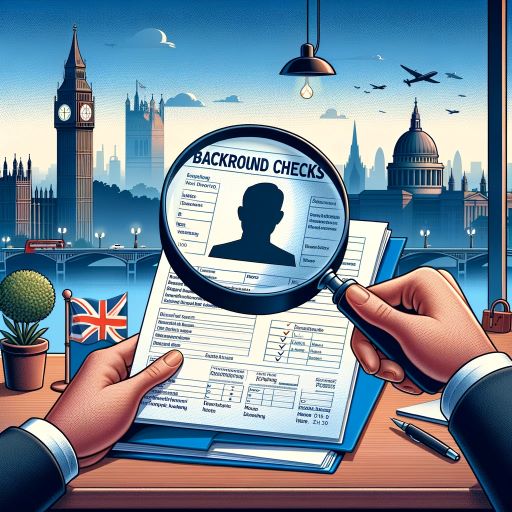
During the BPSS clearance process, individuals must accurately disclose any periods of 6 months or more spent outside the UK in the last 3 years. This requirement aims to evaluate your movements and assess potential risks associated with overseas stays. It's essential to provide precise information about these periods to maintain the credibility and thoroughness of the BPSS clearance process.
The BPSS clearance process also assesses the nationality and immigration status of the applicant, confirming their eligibility to work in the UK. This step is essential not only for legal compliance but also for ensuring the reliability of the workforce in sensitive or security-related roles. It helps prevent the employment of individuals who might have restrictions that could impact their suitability for specific duties.
Security incident reportingBaseline Personnel Security Standard (BPSS) is typically required for individuals applying for roles in various government departments, agencies, or organizations where access to sensitive information or assets is necessary. Some examples of roles that may require BPSS clearance include:
1. Administrative staff in government departments or agencies.
2. Contractors and consultants working on government projects.
3. Support staff in defense or intelligence organizations.
4. Individuals handling classified or sensitive data.
5. Personnel working in law enforcement agencies.
6. Employees in healthcare organizations dealing with patient information.
7. Staff working in financial institutions with access to sensitive financial data.
8. Employees in educational institutions with access to student records or research data.
9. IT professionals managing sensitive information systems for government bodies.
10. Personnel in critical infrastructure sectors such as energy, telecommunications, or transportation.
These are just examples, and the specific roles requiring BPSS clearance may vary depending on the organization and the nature of the work involved. It's essential to check with the employer or relevant authority to determine if BPSS clearance is necessary for a particular role.
Yes, a right to work check is typically included as part of the Baseline Personnel Security Standard (BPSS) clearance process in the UK. This check ensures that individuals have the legal right to work in the UK and are eligible to access employment opportunities requiring BPSS clearance.
The right to work check verifies an individual's immigration status and may involve examining documents such as a passport, visa, biometric residence permit, or residence card. Employers or organizations conducting BPSS clearance will verify that the candidate has the necessary documentation to legally work in the UK.
Ensuring that individuals have the right to work is a crucial aspect of the BPSS clearance process, as it helps maintain compliance with UK immigration laws and prevents unauthorized individuals from accessing sensitive roles or information.
The nationality and immigration status check confirms the candidate's eligibility to work in the UK. This step ensures that the individual has the right to work and is not illegally residing in the country, which is particularly important for maintaining lawful employment practices in sensitive environments.
Cloud technology plays a pivotal role in the BPSS process by providing a centralized platform for storing and accessing data across different locations and devices securely. This facilitates seamless collaboration among HR, security departments, and external vetting agencies, making the process more efficient and less susceptible to delays caused by geographic and temporal barriers.
Checking criminal records focuses on unspent convictions, evaluating an individual's trustworthiness. Confirming employment history validates the accuracy and truthfulness of the past three years of work or activity.

Unlike BPSS checks, DBS checks are required for positions involving contact with vulnerable groups, such as in teaching, healthcare, and social services. DBS checks are more detailed and can include checks on spent and unspent convictions, cautions, reprimands, and warnings held in the UK Police records, depending on the level of check required.
Maintain your BPSS clearance by understanding the validity period and renewal requirements.
BPSS clearance is crucial for government administrative officers who handle confidential documents and make decisions impacting national policies. Ensuring they handle sensitive information responsibly mandates thorough background checking through BPSS.
If you're a non-UK national, make sure you provide proof of residency along with other required documentation. Additionally, be prepared to submit detailed employment history records like payslips and tax documents to validate at least three years of work experience.
It's essential to be forthcoming with this information to facilitate a smooth and thorough BPSS clearance process.
Training for HR personnel on the specifics of BPSS clearance is essential to ensure that all aspects of the vetting process are conducted correctly. Proper training helps mitigate the risk of errors or oversights that could compromise the security of the vetting process and ultimately, the organization's operations.

When comparing BPSS checks to other screening processes, it becomes evident that BPSS focuses specifically on verifying identity, right to work status, criminal records, and employment history.
Employment history verification is a critical part of the BPSS check and can extend its duration. This process involves reaching out to past employers to confirm periods of employment, roles held, and reasons for leaving, which can take time if past employers are slow to respond or if the candidate has worked internationally.
Digital technology enables greater scalability in conducting BPSS checks. As organizations grow and need to process larger volumes of security clearances, digital systems can be scaled to accommodate increased demand without a proportional increase in resources or degradation in the speed of processing.
1. **International Background Checks:** Expect a growing emphasis on international screenings to guarantee thorough vetting for BPSS compliance.
Baseline Personnel Security Standard (BPSS) and Disclosure and Barring Service (DBS) checks are two distinct types of background checks used in the United Kingdom, each serving specific purposes. While BPSS checks are used primarily as a pre-employment screening tool for government-related positions, DBS checks are broader and focus on determining an individual's suitability to work with vulnerable groups including children and adults.
Reviewing a candidate’s employment history is another vital component of the BPSS checks. This involves verifying previous employment details, gaps in employment, and reasons for leaving previous positions. The aim is to confirm the candidate's work history and to identify any inconsistencies that might suggest security risks.

Alongside these, national identity cards or residence permits may also be accepted to establish your identity accurately. It's imperative to make sure that the identification documents you provide are original, unexpired, and legitimate.
BPSS clearance is often a prerequisite for obtaining higher levels of security clearance, such as Security Check (SC) or Developed Vetting (DV). Completing BPSS successfully indicates that an individual has met the baseline requirements for trustworthiness and reliability, which are essential for more in-depth investigations.
1. **Verify Right to Work:** Check the individual's legal right to work status in the country.
Contractor screening